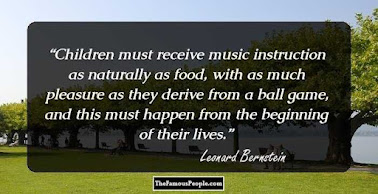Someone just passed on the comments a former SF School student made about my teaching and I was happily struck by her use of the word “fun.” It resonated with the Leonard Bernstein quote I recently found and reminded me that I had written a whole chapter on the subject in my book The ABC’s of Education. Here’s an excerpt from that chapter, followed by my student’s comments.
“F is for Fun, a word that appears on more evaluation forms in my workshops than any other word. And I always read it with mixed emotion, thinking to myself,
“I spent five hours preparing this workshop, trying to connect each thread so that an exquisite pattern would emerge and you might suddenly see, hear, feel, do or understand something that had previously been closed to you, I gathered every musical skill, every teaching practice, every philosophical insight that I have spent decades cultivating to create this experience for you and others so that you might bring it back to your children, and all you can say is …‘Fun?!!!!’”
So I’ve thought a lot about the word “fun”— an alliterative cousin of “fluff,” the beginning of “funny,” with its dangerous glide toward the “funny farm,” A word more associated with recess than with the “serious” work of school. A quick look at Mr. Roget supports this thesis— his thesaurus links fun with “amusing, diverting, droll, entertaining.” If it’s “fun,” then it’s a diversion from the straight and narrow path of education, a droll aside, an entertaining break before getting back to brass tacks (whatever brass tacks are, they sound anything but fun). And the Oxford Dictionary debases “fun” yet further, giving “hoax” as the first definition, followed by “practical joke” and ending with a quote by someone named Walker: “With great deference to Dr. Johnson, I think fun ought rather to be styled low merriment.” Perhaps now the sympathetic reader may understand why I bristle when my life’s work is associated with “low merriment.”
So I am on a mission here to restore some dignity to the word “fun,” make the case that it is fundamental to the best learning, a needed antidote to funereal practices. I want to assert that the mind functions best when a sense of fun prevails. Who to call to the witness stand?
Well, the children for starters. When your students say, “That was fun! Can we do it again?” after a math game, a folk dance or a science experiment, they’re effectively “You’re on to something here! I’m motivated! I’m excited! I want to do it again! You have my attention and I’m with you all the way! And no one in the class is misbehaving because we’re having more fun doing the activity than trying to get out of it or make fun of it!”
That’s the eight-year-old version. If that child is particularly precocious and up on current brain research, the explanation might go like this:
“You are reinforcing my neural pathways with needed repetition so that the learning is imprinted more deeply, motivating that repetition through positive emotional affects and cementing it through associations with those emotions. In the words of my esteemed colleague, Joseph Chilton Pearce:
‘The emotional state in which a learning takes place is probably far more important than the information learned at the time. The state of mind that a child is in when the learning takes place enters in as a major part of the learning itself… Because the emotional/cognitive system is involved in all memory and learning, the emotional state of that learning is brought back into play on a hormonal level— that is, the body kicks back up the very same adrenaline and all the rest of it that went in when the learning took place.’
“If you need further evidence (the eight-year-old continues) of the importance of fun being associated with any learning activity, may I recommend Antonio Damasio’s fine scientific treatise, Descartes’ Error. And now if you’ll excuse me, I have some serious fun to attend to.”
When something is fun, we don’t want it to stop. The body is primed, the heart is open and the mind alert. You can say that the surface area on which the learning can be mapped is increased. We are motivated to learn, and as every teacher knows, motivation is the key to accomplishment.…”
The chapter goes on to show how fun’s antidote, fear, shuts down learning, blocks motivation and makes everyone, children and teachers alike, miserable.
I’ll end with my former student’s words, using the word “fun” five times in seven sentences.
"I think Doug's just a really creative person and he wants students to be creative too. I think he cares so much about students learning and that's his main goal, he wants us to learn and he wants us to have fun at the end of the day. Because a lot of teachers sometimes they might teach but they don't care about having fun. But Doug thought music was fun. And he got all of us to think music was fun. And he just had us have fun during music class. And so I think we always looked forward to it because he created that energy and he created community.

No comments:
Post a Comment
Note: Only a member of this blog may post a comment.